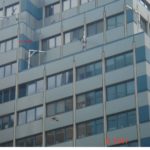Korea Peace Forum, a non-governmental forum that seeks to build peace in the Korean Peninsula, writes “it is now time to gather our power and wisdom to develop the six-party talks into an opportunity for co-prosperity and peace, not only on the Korean Peninsula, but also in Northeast Asia. We should not forget that this is one of the most important historical issues to be solved by the new South Korean government in 2013.”
Archives
NAPSNet 29 September 2011
- DETERRENCE: Global Hawk set to watch over North Korea
- ENERGY SECURITY: Energy in Japan: Out with the old
- DPRK: Unprecedented nuclear strikes of the invincible army: A realistic assessment of North Korea’s operational nuclear capability
- AUSTRAL SECURITY: Ken Henry to oversee blueprint for building Asian ties
- GOVERNANCE AND CIVIL SOCIETY: S. Korean religious leaders end visit to N. Korea
- CLIMATE CHANGE ADAPTATION: Food security and climate change in the Pacific: Rethinking the options
Policy Forum 11-32: Creating a Solar Belt in East Japan: The Energy Future
Son Masayoshi, Softbank Chairman and CEO, writes “It is known that land salinized by the tsunami cannot be cultivated for the next decade. How much money would it take to “recover” such farmland and create taller embankments? What future do we see there? Can the government instead take the lead in creating an “East Japan Solar Belt” as an area for producing new energy for the future? Ports of the past could gain new life as ports of solar and wind energy.”
Park Chung Hee, the CIA, and the Bomb
Peter Hayes and Chung-in Moon analyze Park Chung Hee’s failed
1972-1978 proliferation strategy aimed at obtaining the missile, dual
use technology, and fissile material needed to develop a nuclear bomb
and establish a South Korean nuclear weapons program. The authors review
the declassified document, South Korea: Nuclear Developments and Strategic Decisionmaking,
issued in June 1978 by the CIA’s National Foreign Assessment Center.
In addition to providing useful historical insights into Park’s actions
and intentions, the 1978 report bears directly on current debates on
how to respond to the North Korean nuclear breakout, and whether South
Korea should respond in kind.
NAPSNet 22 September 2011
- DETERRENCE: Japan’s evolving space program, interview with Saadia Pekkanen
- ENERGY SECURITY: Asia’s rising energy and resource nationalism: Implications for the United States, China, and the Asia-Pacific Region
- CLIMATE CHANGE ADAPTATION: Scenario planning for climate adaptation
- DPRK: South Korean nuclear envoy arrives in Beijing for talks with northern counterpart
- GOVERNANCE AND CIVIL SOCIETY: Chinese protestors accuse solar panel plant of pollution
- AUSTRAL SECURITY: Who goes where? Positioning the ADF for the Asia-Pacific century
Unprecedented Nuclear Strikes of the Invincible Army: A Realistic Assessment of North Korea’s Operational Nuclear Capability
Peter Hayes, Professor, RMIT University and Executive Director of the Nautilus Institute and Scott Bruce, Director of the Nautilus Institute, San Francisco assess that North Korea’s options for a nuclear strike are severely constrained—so much so that the only credible use of the DPRK’s nuclear arsenal is to detonate a bomb within North Korea itself to slow down or to stop an invasion in the context of an all-out war with the United States and South Korea. They conclude that, “At this stage, North Korea’s outrageous nuclear threats against targets outside its borders are not backed up by actual capabilities. Countering the North’s rhetorical threat with more nuclear extended deterrence raises tensions instead of addressing the underlying problem of nuclear insecurity. Ultimately, the only way forward is to re-engage the North, and identify pathways that create confidence and reduce the mutual perception of the threat of massive destruction, whether by conventional or nuclear weapons.”
Policy Forum 11-31: Korea Talks Must Quickly Move From Tactics to Strategy

Stephen Costello, an independent analyst and consultant, asserts that progress toward North Korean denuclearization will require far more work from the US. He writes, “If Washington is content to wait 18 months for a change of parties in Seoul before considering a return to broader, bolder engagement [with North Korea], then US policy rests on a fragile footing. Failure to lead now on these important issues will ensure no progress is made in the near term, and that bolder action will be more difficult in the future.”
NAPSNet 15 September 2011
- DETERRENCE: A ‘black hole’ in the global nonproliferation regime: The case of Taiwan
- AUSTRAL SECURITY: Cyber war added to ANZUS pact
- DPRK: S. Korean president sets peace as precondition of inter-Korean summit
- ENERGY SECURITY: Case study of green economy policies: Korea
- CLIMATE CHANGE AND ADAPTATION: Climate resilient infrastructure: Preparing for a changing climate
- GOVERNANCE AND CIVIL SOCIETY: Backlash against Korean wave in Japan
The Current Status of Green Growth in Korea: Energy and Urban Security
Sun-Jin Yun, Professor at the Graduate School of Environmental Studies, Seoul National University and Myungrae Cho, Professor, Dankook University, write “The ROK’s green growth strategy, as currently formulated, includes some impressive targets and demonstration projects, but at its heart emphasizes economic growth and national industrial competitiveness rather than being a true plan for “greening” of the Korean economy. As such, the ROK’s current “green” policies are in effect mostly policies for further benefiting existing large ROK industries, including the nuclear and construction industries.”
NAPSNet 8 September 2011
- DETERRENCE: Nuclear drawdown, deterrence, and non-proliferation
- CLIMATE CHANGE ADAPTION: A climate for conflict or cooperation? Addressing the securitisation of climate change
- ENERGY SECURITY: China’s nuclear power plans unfazed by Fukushima disaster
- DPRK: The environmental protection law amended – environmental certification system to be newly introduced
- GOVERNANCE AND CIVIL SOCIETY: Jeju project resumes after rally falls flat
- AUSTRAL SECURITY: Australian High Court rules against Malaysia swap deal

